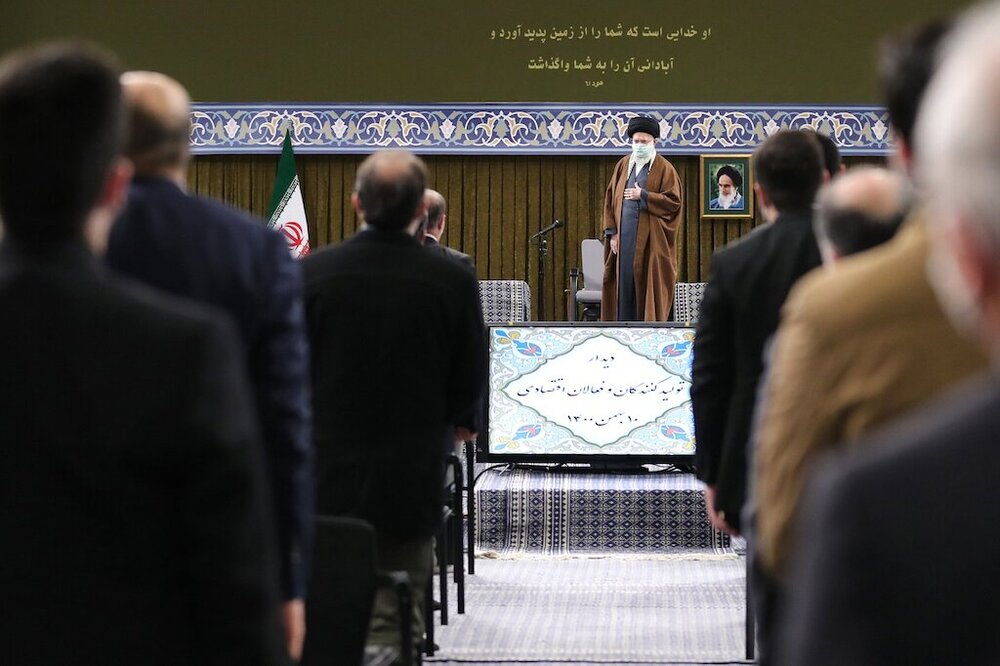Leader reflects on U.S. ulterior motives

TEHRAN – Leader of the Islamic Revolution Ayatollah Seyed Ali Khamenei has reflected on the ulterior motive of the U.S. in significantly increasing economic pressure on Iran over the last few years.
In a meeting with a group of manufacturers, entrepreneurs, and officials in the economic and industry sectors on Sunday, the Leader extensively addressed the economic state of play amid ongoing negotiations between Iran and the P4+1 group of countries – China, Russia, France, and Britain plus Germany- in Vienna.
Since 2018, Iran and the United States have been at daggers drawn due to a Washington decision to impose “the strongest sanctions in history” against Tehran. On May 8 of that year, then U.S. President Donald Trump unilaterally withdrew the U.S. from a 2015 nuclear deal known as the Joint Comprehensive Plan of Action (JCPOA) and initiated the so-called “maximum pressure” policy that continues to this day despite the change of U.S. administration from Republican Trump to Democrat Joe Biden who campaigned on returning the U.S. to the JCPOA in the 2020 presidential election.
Trump imposed blanket economic sanctions on Iran and Biden kept them in place even after Trump left the White House. The Trump administration said the goal of their maximum pressure campaign was to force Iran into acceding to what they called a “better deal,” one that would have put stronger restrictions on Iran’s nuclear program.
Trump has gone and the deal he itched for was never made. But the real motives behind the Trump administration’s economic pressure on Iran remain an open question. Did Trump really want a deal with Iran, or he simply did use the better-deal rhetoric as a cover for other intentions?
Ayatollah Khamenei offered an answer to this question in his latest speech. He described the maximum pressure policy as a resounding failure that was brought about by Iranian workers and economic operators.
“The Maximum Pressure campaign has led to the U.S. abject failure. These are the words of the U.S. Department of State. Their spokesman stated that the maximum pressure campaign against Iran has led to the U.S. abject failure,” the Leader said, according to a readout published by the khamenei.ir.
He added, “The aim of the enemies’ economic war was the collapse of Iran’s economy. Of course, the collapse of the economy would have been a prelude. By destroying Iran’s economy, they sought to pit the people against the Islamic Republic and fulfill their vicious political goals.”
The Leader then described manufacturing as Jihad, a sacred struggle by believers against enemies. “Today, production is jihad. Not every endeavor is jihad. Jihad is any endeavor that is concerned with the enemy’s attacks and moves and confronting them. Today, the enemies’ hostility toward the economy of our country is obvious,” Ayatollah Khamenei asserted.
He described entrepreneurs and economic operators as “officers” and workers as “devoted fighters” in the “sacred defense” against “economic warfare” waged by the U.S.
The Leader described as Jihad and a great act of worship the efforts of manufacturers to keep production up and running in circumstances under which the enemy seeks to prevent Iran from exporting oil and gas and cut off its access to hard currency.
Some pundits believe that the Trump administration, through its maximum pressure campaign, had its heart set on a replication of a Soviet-style collapse in Iran. They point, for instance, to Trump Secretary of State Mike Pompeo’s infatuation with the modus operandi of Ronald Reagan against the Soviet Union, which some Iran hawks in Washington and Tel Aviv believe hastened the collapse of the Soviet Union.
And Reagan’s Soviet policy was centered, to large extent, on covert and overt economic warfare among other things.
